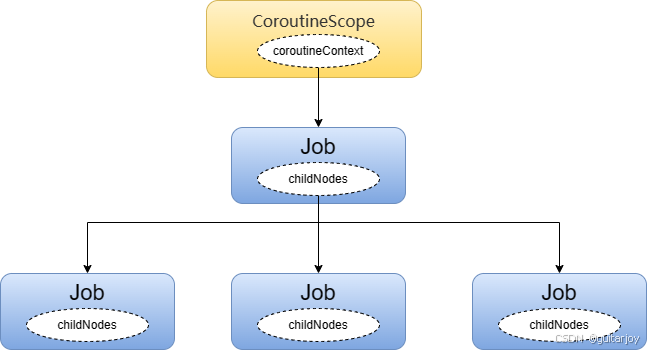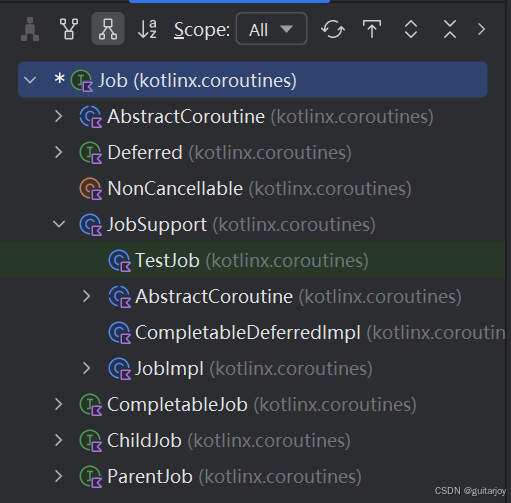前言
Kotlin的Project Lead,Roman Elizarov的一片文章https://elizarov.medium.com/structured-concurrency-722d765aa952介绍了Structured Concurrency发展的背景。相对Kotlin1.1时代,后来新增的Structured Concurrency理念,也就是我们现在所熟悉的协程版本所具备的特性,解决了各种复杂业务场景下,例如协程嵌套、异步等等使用方式时所面临的生命周期管理问题。本文通过梳理源码来试图理解Structured Concurrency的具体含义和实现原理。
概念理解
常见的业务场景如下:
suspend` `fun` `loadAndCombine(name1: String, name2: String): Image {`
`val deferred1 = async {` `loadImage(name1)` `}`
`val deferred2 = async {` `loadImage(name2)` `}`
`return` `combineImages(deferred1.await(), deferred2.await())`
`}deferred1和deferred2都是异步执行的,最终需要将二者的执行结果合并后返回。而如果此时其中一个loadImage执行异常,或者主动取消,很难去通知另一个LoadImage及时停止执行,释放资源。
或者如下场景:
val scope =` `CoroutineScope(Job())`
` scope.launch` `{`
`printLog("launch1")`
` launch {`
`delay(20000)`
`printLog("launch1-1")`
`}`
`printLog("launch1 done")`
`cancel()`
`}在外层的launch执行到最后,希望cancel内部所有的子协程。在没有Structrued Concurrency特性的时候,要实现这种逻辑需要类似使用线程时的处理方式。而Structrued Concurrency特性可以让我们在cancel外层协程时,自动cancel其里面所有的子协程。
这就是所谓的对协程生命周期的管理。为了能够将所有协程的生命周期完全管理起来,Kotlin使用了CoroutineScope。
Coroutines are always related to some local scope in your application, which is an entity with a limited life-time, like a UI element.
CoroutineScope相当于圈定了一个空间,所有的协程都在这个空间里面执行。这样所有协程的声明周期就可以通过CoroutineScope来进行管理了。
实现原理
我们知道每个launch都是一个Job。Job和CoroutineScope的关系如下:

再次根据这个例子,看这种关系如何实现的:
val scope =` `CoroutineScope(Job())`
` scope.launch` `{`
`printLog("launch1")`
` launch {`
`delay(20000)`
`printLog("launch1-1")`
`}`
`printLog("launch1 done")`
`cancel()`
`}`
`首先看新建CoroutineScope(Job())
kotlinx.coroutines-master\kotlinx-coroutines-core\common\src\CoroutineScope.kt`
`public` `fun` `CoroutineScope(context: CoroutineContext): CoroutineScope =`
`ContextScope(if` `(context[Job]` `!=` `null) context else context +` `Job())internal` `class` `ContextScope(context: CoroutineContext)` `: CoroutineScope {`
`override` `val coroutineContext: CoroutineContext = context`
`// CoroutineScope is used intentionally for user-friendly representation`
`override` `fun` `toString(): String =` `"CoroutineScope(coroutineContext=$coroutineContext)"`
`}`
`CoroutineScope本身是一个接口,这里的CoroutineScope不是构造函数,而是一个顶层函数。这里有两个关注点:
context[Job]和context + Job()
所有的Job、CoroutineDispatcher都继承于CoroutineContext。因此CoroutineScope函数的参数我们可以新建一个Job(), 也可以传一个CoroutineDispatcher。以Job()为例,看下其实现:

public` `interface Job : CoroutineContext.Element` `{`
`/**`
` * Key for [Job] instance in the coroutine context.`
` */`
`public` `companion` `object Key : CoroutineContext.Key<Job>Job继承于CoroutineContext.Element,
public` `interface Element : CoroutineContext {`
`/**`
` * A key of this coroutine context element.`
` */`
`public` `val key: Key<*>`
`public` `override` `operator` `fun` `<E : Element>` `get(key: Key<E>): E?` `=`
`@Suppress("UNCHECKED_CAST")`
`if` `(this.key == key)` `this` `as E else` `null`
`public` `override` `fun` `<R>` `fold(initial: R, operation:` `(R, Element)` `-> R): R =`
`operation(initial,` `this)`
`public` `override` `fun` `minusKey(key: Key<*>): CoroutineContext =`
`if` `(this.key == key) EmptyCoroutineContext else` `this`
`}注意这里的get函数,其返回值取决于key。key在哪里赋值的?
Job也是一个接口,其Job()也是一个顶层函数:
public` `fun` `Job(parent: Job?` `=` `null): CompletableJob =` `JobImpl(parent)internal` `open` `class` `JobImpl(parent: Job?)` `:` `JobSupport(true), CompletableJob {JobImp继承JobSupport,而JobSupport是Job的具体实现
public` `open` `class JobSupport constructor(active: Boolean)` `: Job, ChildJob, ParentJob {`
`final` `override` `val key: CoroutineContext.Key<*>` `get()` `= Job可以看到key的实际值为Job。
所以,如果CoroutineScope(...)的参数传入的是Job(), 则context[Job]返回的是Job。
那context + Job()代表什么呢?
在CoroutineContext的接口声明里看到了plus操作符重载:
public` `operator` `fun` `plus(context: CoroutineContext): CoroutineContext =`
`if` `(context === EmptyCoroutineContext)` `this` `else` `// fast path -- avoid lambda creation`
` context.fold(this)` `{ acc, element ->`
`val removed = acc.minusKey(element.key)`
`if` `(removed === EmptyCoroutineContext) element else` `{`
`// make sure interceptor is always last in the context (and thus is fast to get when present)`
`val interceptor = removed[ContinuationInterceptor]`
`if` `(interceptor ==` `null)` `CombinedContext(removed, element)` `else` `{`
`val left = removed.minusKey(ContinuationInterceptor)`
`if` `(left === EmptyCoroutineContext)` `CombinedContext(element, interceptor)` `else`
`CombinedContext(CombinedContext(left, element), interceptor)`
`}`
`}`
`}是将两个CoroutineContext合并成了CombinedContext。CombinedContext本身也是一个CoroutineContext。
综上, 在新建CoroutineScope的时候,如果传入了一个Job,则使用这个Job,如果没有传入Job(可能传入一个CoroutineDispatcher),则新建一个Job。然后将Job赋值给ContextScope的coroutineContext成员变量。
如此一来,一个新建的CoroutineScope就关联了一个顶层的Job。
使用launch创建一个协程:
kotlinx.coroutines-master\kotlinx-coroutines-core\common\src\Builders.common.kt`
`public` `fun CoroutineScope.launch(`
` context: CoroutineContext = EmptyCoroutineContext,`
` start: CoroutineStart = CoroutineStart.DEFAULT,`
` block:` `suspend CoroutineScope.()` `-> Unit`
`): Job {`
`val newContext =` `newCoroutineContext(context)`
`val coroutine =` `if` `(start.isLazy)`
`LazyStandaloneCoroutine(newContext, block)` `else`
`StandaloneCoroutine(newContext, active =` `true)`
` coroutine.start(start, coroutine, block)`
`return coroutine`
`}`
`首先,launch是CoroutineScope的扩展函数,也就是说只能在CoroutineScope内创建协程。newCoroutineContext(context):
public` `actual` `fun CoroutineScope.newCoroutineContext(context: CoroutineContext): CoroutineContext {`
`val combined =` `foldCopies(coroutineContext, context,` `true)`
`val debug =` `if` `(DEBUG) combined +` `CoroutineId(COROUTINE_ID.incrementAndGet())` `else combined`
`return` `if` `(combined !== Dispatchers.Default && combined[ContinuationInterceptor]` `==` `null)`
` debug + Dispatchers.Default else debug`
`}这里context是EmptyCoroutineContext,coroutineContext是刚才CoroutineScope(Job())传入的顶层Job。经过foldCopies后,返回的combined可以看做是顶层Job的封装。在return语句中可以看到debug(即顶层Job)加上了debug + Dispatchers.Default,这就是为什么默认会运行在Dispatchers.Default线程的原因。
创建了newContext后,如果start.isLazy会构建LazyStandaloneCoroutine,否则构建StandaloneCoroutine。start是协程的执行方式,默认为立即执行,也可以懒加载执行。具体见kotlinx.coroutines-master\kotlinx-coroutines-core\common\src\CoroutineStart.kt
这里构建的是默认的StandaloneCoroutine
private` `open` `class` `StandaloneCoroutine(`
` parentContext: CoroutineContext,`
` active: Boolean`
`)` `: AbstractCoroutine<Unit>(parentContext, initParentJob =` `true, active = active)` `{`
`override` `fun` `handleJobException(exception: Throwable): Boolean {`
`handleCoroutineException(context, exception)`
`return` `true`
`}`
`}parentContext参数传入的是刚才构建的newContext,也就是顶层Job。initParentJob默认值为true。接着看下他的继承类AbstractCoroutine:
public` `abstract` `class AbstractCoroutine<in T>(`
` parentContext: CoroutineContext,`
` initParentJob: Boolean,`
` active: Boolean`
`)` `:` `JobSupport(active), Job, Continuation<T>, CoroutineScope {`
`init` `{`
`/*`
` * Setup parent-child relationship between the parent in the context and the current coroutine.`
` * It may cause this coroutine to become _cancelling_ if the parent is already cancelled.`
` * It is dangerous to install parent-child relationship here if the coroutine class`
` * operates its state from within onCancelled or onCancelling`
` * (with exceptions for rx integrations that can't have any parent)`
` */`
`if` `(initParentJob)` `initParentJob(parentContext[Job])`
`}AbstractCoroutine继承了JobSupport、Job,也就是说,StandaloneCoroutine实际上是构造了一个Job。看下这里的initParentJob(parentContext[Job]),parentContext是刚才传进来的顶层Job的封装newContext,这里取出其Job传进initParentJob
protected` `fun` `initParentJob(parent: Job?)` `{`
` assert { parentHandle ==` `null` `}`
`if` `(parent ==` `null)` `{`
` parentHandle = NonDisposableHandle`
`return`
`}`
` parent.start()` `// make sure the parent is started`
`val handle = parent.attachChild(this)`
` parentHandle = handle`
`// now check our state _after_ registering (see tryFinalizeSimpleState order of actions)`
`if` `(isCompleted)` `{`
` handle.dispose()`
` parentHandle = NonDisposableHandle // release it just in case, to aid GC`
`}`
`}这里会执行parent.attachChild(this)。字面上理解即将launch创建出来的新Job作为Child加入到顶层的Job中去。
关联父子Job
看下具体实现:
kotlinx.coroutines-master\kotlinx-coroutines-core\common\src\JobSupport.kt
public` `final` `override` `fun` `attachChild(child: ChildJob): ChildHandle {`
`val node =` `ChildHandleNode(child).also` `{ it.job =` `this` `}`
`val added =` `tryPutNodeIntoList(node)` `{ _, list ->`
`// First, try to add a child along the cancellation handlers`
`val addedBeforeCancellation = list.addLast(`
` node,`
` LIST_ON_COMPLETION_PERMISSION or LIST_CHILD_PERMISSION or LIST_CANCELLATION_PERMISSION`
`)`
`...`
` node.invoke(rootCause)`
`if` `(addedBeforeCompletion)` `{`
`/** The root cause can't be null: since the earlier addition to the list failed, this means that`
` * the job was already cancelled or completed. */`
` assert { rootCause !=` `null` `}`
`true`
`}` `else` `{`
`/** No sense in retrying: we know it won't succeed, and we already invoked the handler. */`
`return NonDisposableHandle`
`}`
`}`
`}`
`if` `(added)` `return node`
`/** We can only end up here if [tryPutNodeIntoList] detected a final state. */`
` node.invoke((state as? CompletedExceptionally)?.cause)`
`return NonDisposableHandle`
`}首先构造一个ChildHandleNode
private` `class` `ChildHandleNode(`
`@JvmField` `val childJob: ChildJob`
`)` `:` `JobNode(), ChildHandle {`
`override` `val parent: Job get()` `= job`
`override` `val onCancelling: Boolean get()` `=` `true`
`override` `fun` `invoke(cause: Throwable?)` `= childJob.parentCancelled(job)`
`override` `fun` `childCancelled(cause: Throwable): Boolean = job.childCancelled(cause)`
`}这里parent传入的是顶层Job,childJob是launch新建的Job
tryPutNodeIntoList
private` `inline` `fun` `tryPutNodeIntoList(`
` node: JobNode,`
` tryAdd:` `(Incomplete, NodeList)` `-> Boolean`
`): Boolean {`
` loopOnState { state ->`
`when` `(state)` `{`
`is Empty ->` `{` `// EMPTY_X state -- no completion handlers`
`if` `(state.isActive)` `{`
`// try to move to the SINGLE state`
`if` `(_state.compareAndSet(state, node))` `return` `true`
`}` `else`
`promoteEmptyToNodeList(state)` `// that way we can add listener for non-active coroutine`
`}`
`is Incomplete ->` `when` `(val list = state.list)` `{`
`null` `->` `promoteSingleToNodeList(state as JobNode)`
`else` `->` `if` `(tryAdd(state, list))` `return` `true`
`}`
`else` `->` `return` `false`
`}`
`}`
`}private` `val _state = atomic<Any?>(if` `(active) EMPTY_ACTIVE else EMPTY_NEW)`
`private` `inline` `fun` `loopOnState(block:` `(Any?)` `-> Unit): Nothing {`
`while` `(true)` `{`
`block(state)`
`}`
`}state是什么?
kotlinx.coroutines-master\kotlinx-coroutines-core\common\src\JobSupport.kt`
`private` `val EMPTY_NEW =` `Empty(false)`
`private` `val EMPTY_ACTIVE =` `Empty(true)在JobSupport中,维护了一个状态机,管理Job的不同状态阶段。这里EMPTY_NEW和 EMPTY_ACTIVE是其具体状态。
private` `class` `Empty(override` `val isActive: Boolean)` `: Incomplete {`
`override` `val list: NodeList?` `get()` `=` `null`
`override` `fun` `toString(): String =` `"Empty{${if (isActive) "Active" else "New" }}"`
`}其内维护了一个list
简言之,就是tryAdd(state, list)会将自己的state内的list传递给调用它的tryPutNodeIntoList,在回头看tryPutNodeIntoList,
val addedBeforeCompletion = list.addLast(`
` node,`
` LIST_CHILD_PERMISSION or LIST_ON_COMPLETION_PERMISSION`
`)会将子Job加到list中。
由此一来,CoroutineScope边构建了它的Job树。
Job的执行
回到CoroutineScope.launch
public` `fun CoroutineScope.launch(`
` context: CoroutineContext = EmptyCoroutineContext,`
` start: CoroutineStart = CoroutineStart.DEFAULT,`
` block:` `suspend CoroutineScope.()` `-> Unit`
`): Job {`
`val newContext =` `newCoroutineContext(context)`
`val coroutine =` `if` `(start.isLazy)`
`LazyStandaloneCoroutine(newContext, block)` `else`
`StandaloneCoroutine(newContext, active =` `true)`
` coroutine.start(start, coroutine, block)`
`return coroutine`
`}在构建完coroutine后,执行coroutine.start
public` `fun` `<R>` `start(start: CoroutineStart, receiver: R, block:` `suspend R.()` `-> T)` `{`
`start(block, receiver,` `this)`
`}public` `enum` `class CoroutineStart {`
`...`
`public` `operator` `fun` `<R, T>` `invoke(block:` `suspend R.()` `-> T, receiver: R, completion: Continuation<T>): Unit =`
`when` `(this)` `{`
` DEFAULT -> block.startCoroutineCancellable(receiver, completion)`
` ATOMIC -> block.startCoroutine(receiver, completion)`
` UNDISPATCHED -> block.startCoroutineUndispatched(receiver, completion)`
` LAZY -> Unit // will start lazily`
`}在这里开始执行协程。
Structured Concurrency的典型作用:协程的cancel
当执行scope的cancel时:
public` `fun CoroutineScope.cancel(cause: CancellationException?` `=` `null)` `{`
`val job = coroutineContext[Job]` `?:` `error("Scope cannot be cancelled because it does not have a job: $this")`
` job.cancel(cause)`
`}是通过coroutineContext[Job]获取了顶层Job,然后执行其cancel
kotlinx.coroutines-master\kotlinx-coroutines-core\common\src\JobSupport.kt`
`public` `override` `fun` `cancel(cause: CancellationException?)` `{`
`cancelInternal(cause ?:` `defaultCancellationException())`
`}`
`public` `open` `fun` `cancelInternal(cause: Throwable)` `{`
`cancelImpl(cause)`
`}`
`internal` `fun` `cancelImpl(cause: Any?): Boolean {`
`var finalState: Any?` `= COMPLETING_ALREADY`
`if` `(onCancelComplete)` `{`
`// make sure it is completing, if cancelMakeCompleting returns state it means it had make it`
`// completing and had recorded exception`
` finalState =` `cancelMakeCompleting(cause)`
`if` `(finalState === COMPLETING_WAITING_CHILDREN)` `return` `true`
`}`
`if` `(finalState === COMPLETING_ALREADY)` `{`
` finalState =` `makeCancelling(cause)`
`}`
`return` `when` `{`
` finalState === COMPLETING_ALREADY ->` `true`
` finalState === COMPLETING_WAITING_CHILDREN ->` `true`
` finalState === TOO_LATE_TO_CANCEL ->` `false`
`else` `->` `{`
`afterCompletion(finalState)`
`true`
`}`
`}`
`}以makeCancelling为例
private` `fun` `makeCancelling(cause: Any?): Any?` `{`
`var causeExceptionCache: Throwable?` `=` `null` `// lazily init result of createCauseException(cause)`
` loopOnState { state ->`
`when` `(state)` `{`
`is Finishing ->` `{` `// already finishing -- collect exceptions`
`val notifyRootCause =` `synchronized(state)` `{`
`if` `(state.isSealed)` `return TOO_LATE_TO_CANCEL // already sealed -- cannot add exception nor mark cancelled`
`// add exception, do nothing is parent is cancelling child that is already being cancelled`
`val wasCancelling = state.isCancelling // will notify if was not cancelling`
`// Materialize missing exception if it is the first exception (otherwise -- don't)`
`if` `(cause !=` `null` `||` `!wasCancelling)` `{`
`val causeException = causeExceptionCache ?:` `createCauseException(cause).also` `{ causeExceptionCache = it }`
` state.addExceptionLocked(causeException)`
`}`
`// take cause for notification if was not in cancelling state before`
` state.rootCause.takeIf` `{` `!wasCancelling }`
`}`
` notifyRootCause?.let` `{` `notifyCancelling(state.list, it)` `}`
`return COMPLETING_ALREADY`
`}`
`is Incomplete ->` `{`
`// Not yet finishing -- try to make it cancelling`
`val causeException = causeExceptionCache ?:` `createCauseException(cause).also` `{ causeExceptionCache = it }`
`if` `(state.isActive)` `{`
`// active state becomes cancelling`
`if` `(tryMakeCancelling(state, causeException))` `return COMPLETING_ALREADY`
`}` `else` `{`
`// non active state starts completing`
`val finalState =` `tryMakeCompleting(state,` `CompletedExceptionally(causeException))`
`when` `{`
` finalState === COMPLETING_ALREADY ->` `error("Cannot happen in $state")`
` finalState === COMPLETING_RETRY ->` `return@loopOnState`
`else` `->` `return finalState`
`}`
`}`
`}`
`else` `->` `return TOO_LATE_TO_CANCEL // already complete`
`}`
`}`
`}假如协程在运行中,则执行tryMakeCancelling
private` `fun` `tryMakeCancelling(state: Incomplete, rootCause: Throwable): Boolean {`
` assert { state !is Finishing }` `// only for non-finishing states`
` assert { state.isActive }` `// only for active states`
`// get state's list or else promote to list to correctly operate on child lists`
`val list =` `getOrPromoteCancellingList(state)` `?:` `return` `false`
`// Create cancelling state (with rootCause!)`
`val cancelling =` `Finishing(list,` `false, rootCause)`
`if` `(!_state.compareAndSet(state, cancelling))` `return` `false`
`// Notify listeners`
`notifyCancelling(list, rootCause)`
`return` `true`
`}state.compareAndSet进行状态机切换,随后执行notifyCancelling
private` `fun` `notifyCancelling(list: NodeList, cause: Throwable)` `{`
`// first cancel our own children`
`onCancelling(cause)`
` list.close(LIST_CANCELLATION_PERMISSION)`
`notifyHandlers(list, cause)` `{ it.onCancelling }`
`// then cancel parent`
`cancelParent(cause)` `// tentative cancellation -- does not matter if there is no parent`
`}private` `fun` `notifyCancelling(list: NodeList, cause: Throwable)` `{`
`// first cancel our own children`
`onCancelling(cause)`
` list.close(LIST_CANCELLATION_PERMISSION)`
`notifyHandlers(list, cause)` `{ it.onCancelling }`
`// then cancel parent`
`cancelParent(cause)` `// tentative cancellation -- does not matter if there is no parent`
`}`
`private` `inline` `fun` `notifyHandlers(list: NodeList, cause: Throwable?, predicate:` `(JobNode)` `-> Boolean)` `{`
`var exception: Throwable?` `=` `null`
` list.forEach` `{ node ->`
`if` `(node is JobNode &&` `predicate(node))` `{`
`try` `{`
` node.invoke(cause)`
`}` `catch` `(ex: Throwable)` `{`
` exception?.apply` `{` `addSuppressed(ex)` `}` `?: run {`
` exception =` `CompletionHandlerException("Exception in completion handler $node for $this", ex)`
`}`
`}`
`}`
`}`
` exception?.let` `{` `handleOnCompletionException(it)` `}`
`node.invoke(cause)的实现
private` `class` `InvokeOnCancelling(`
`private` `val handler: CompletionHandler`
`)` `:` `JobNode()` `{`
`// delegate handler shall be invoked at most once, so here is an additional flag`
`private` `val _invoked =` `atomic(false)`
`override` `val onCancelling get()` `=` `true`
`override` `fun` `invoke(cause: Throwable?)` `{`
`if` `(_invoked.compareAndSet(expect` `=` `false, update =` `true)) handler.invoke(cause)`
`}`
`}private` `fun` `cancelParent(cause: Throwable): Boolean {`
`// Is scoped coroutine -- don't propagate, will be rethrown`
`if` `(isScopedCoroutine)` `return` `true`
`/* CancellationException is considered "normal" and parent usually is not cancelled when child produces it.`
` * This allow parent to cancel its children (normally) without being cancelled itself, unless`
` * child crashes and produce some other exception during its completion.`
` */`
`val isCancellation = cause is CancellationException`
`val parent = parentHandle`
`// No parent -- ignore CE, report other exceptions.`
`if` `(parent ===` `null` `|| parent === NonDisposableHandle)` `{`
`return isCancellation`
`}`
`// Notify parent but don't forget to check cancellation`
`return parent.childCancelled(cause)` `|| isCancellation`
`}即先将自己的状态切换到取消中,随后notifyHandlers通过遍历list通知自己的children执行cancel。最后再通过cancelParent告知父Job自己的分支cancel完毕。
总结:
- 所有协程都运行在CoroutineScope中,这种限定是通过launch、async、runBlock等构建协程的函数都是作为CoroutineScope扩展函数来实现的。
- CoroutineScope创建过程中,必定会构建一个顶层Job(后者外部传入),通过coroutineContext与其关联。
- 每个launch都响应构建了一个Job,并将此Job加入到父Job的list中,由此维护了一个Job树。
- Structure Concurrency 的 具体实现 是 通过 维护 Job 树 的生命周期 完成 的 。